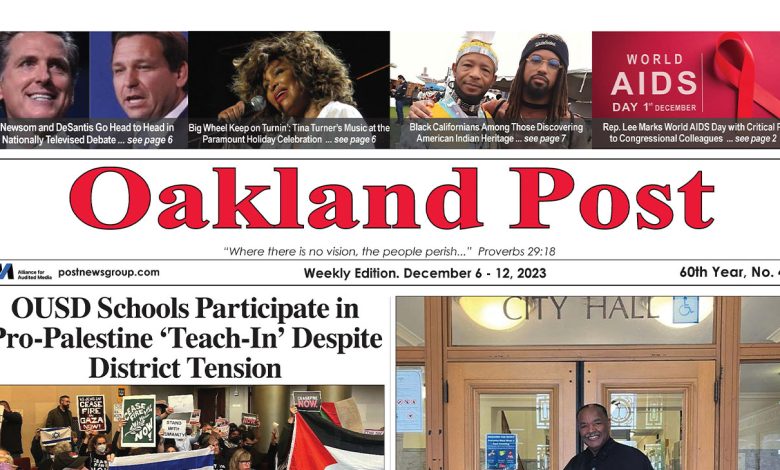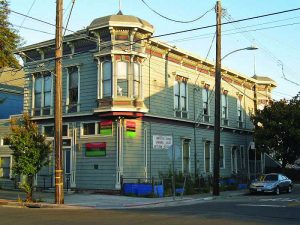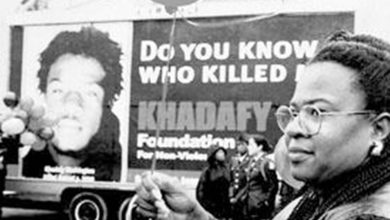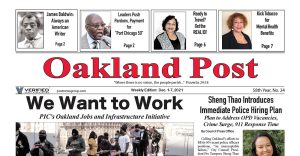Oakland Post: Week of December 6 – 12, 2023

By Antonio Ray Harvey | California Black Media
The Assembly Committee on Elections recently held an informational hearing on a bill that would have given more “entities” the authority to register eligible voters in California.
Known as the California New Motor Voter program, Senate Bill (S.B.) 299 also promised to further automate and streamline the voter registration process while adding safeguards to prevent voter fraud or unlawful voting.
But the bill stalled in the Senate Health Committee last June prompting supporters to hold the hearing to discuss strategies for bridging voter turnout gaps, ensuring accurate registration, and reviewing the impact of recent electoral reforms.
Currently, eligible California residents are automatically registered or pre-registered to vote when they obtain or renew a license or state identification card at the Department of Motor Vehicles (DMV) or conduct other transactions. The DMV sends their information to the Secretary of State (SOS) office for processing “unless the person opts out or is ineligible to vote.”
Supporters of S.B. 299 are confident the law would enfranchise more Black and other marginalized voters.
If lawmakers vote to pass it during the next legislative session, the law will expand the definition of “voter registration agency” to include all entities designated by SOS.
S.B. 299 also provides an option to decline to register to vote.
During the hearing, Mindy Romero, founder and director of the Center for Inclusive Democracy at the University of Southern California, provided information on the turnout gap between Black and white voters.
In the 2020 general election, Romero stated, 64% of adult Black voters cast a ballot while 74.5% of white, non-Latino eligible voters did, a 10.5% turnout gap.
The gap drastically increased in 2022. White voters that cast a ballot decreased to 62.8% in the 2022 General Election while Black voters numbers fell to 43.3%.
“What I really want to emphasize is we still have to make it easier to vote but we also have to make people want to vote. It’s the ‘motivation question,’” Romero said. “It’s a story, of course, of our electoral system today that has not supported these groups and made it harder to vote and made it harder to sell the importance of voting.”
Several state agencies in California, such as Covered California, already have the authority to register or pre-register voters.
According to the National Voter Registration Act, federal law authorizes states “to designate state government agencies and offices that offer public assistance or services to people with disabilities, as well as other suitable offices, as voter registration agencies.”
Those voter registration agencies “could include schools, city and county clerk’s offices, fishing and hunting license bureaus, government revenue offices, and unemployment compensation offices.”
Under S.B. 299, SOS would have the authority to designate other entities to register Californians to vote and the process would be simplified with increased digitization.
S.B. 299 is co-authored by Sen. Caroline Menjivar (D-Van Nuys) and Sen. Monique Limón (D-Santa Barbara).
“Voting is one of the most powerful ways to initiate change in the United States and simplifying voter registration will have an instant and dramatic effect on voter participation throughout California,” said Limón in a statement.
S.B. 299 provides a path to 100% voter registration, advocates say. It was designed to align with similar legislation passed in Alaska, Delaware, Wash., D.C., Colorado, New Mexico, Massachusetts, Minnesota, Nevada, Oregon, and Washington.
As of May 2022, the state had nearly 22 million registered voters, about 82% of eligible voters in California, according to a Public Policy Institute of California report.
Currently, California has 4.7 million eligible but unregistered voters, according to GDC. They are disproportionately from working-class Black, Latino, and Asian American communities.
Kristin Nimmers, policy and campaign manager for the California Black Power Network, said the state has tried to improve the voter registration process but needs to push bills that prioritize the most vulnerable populations, including eligible individuals who were formerly incarcerated.
The other pressing barriers facing Black voters, Nimmers said, are a lack of understanding of the voting process due to information gaps and inadequate outreach, a mistrust of the system, and limited language access.
Nimmers also said that the pandemic has impacted the voting and registration behaviors in African American and Black immigrant communities. “Black residents are facing gentrification and displacement and are moving out of traditional Black neighborhoods … They aren’t updating their registration.”






